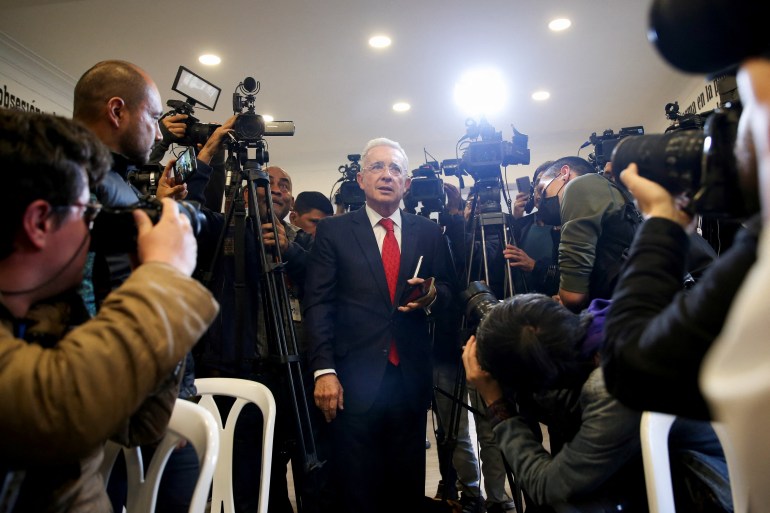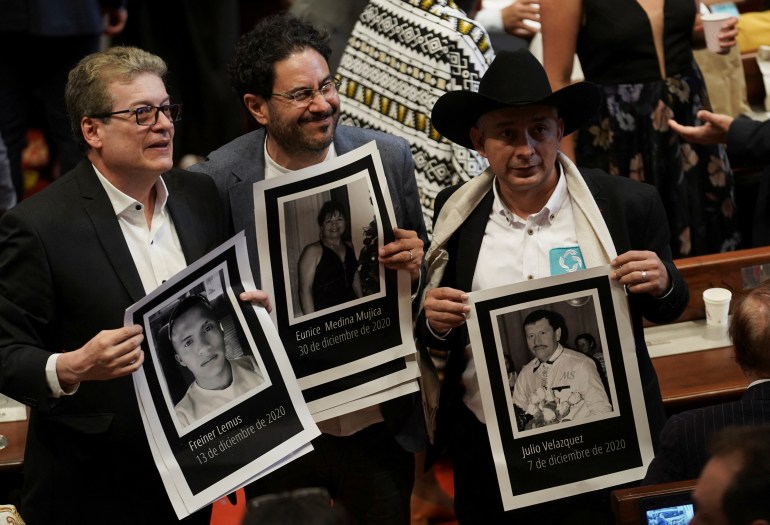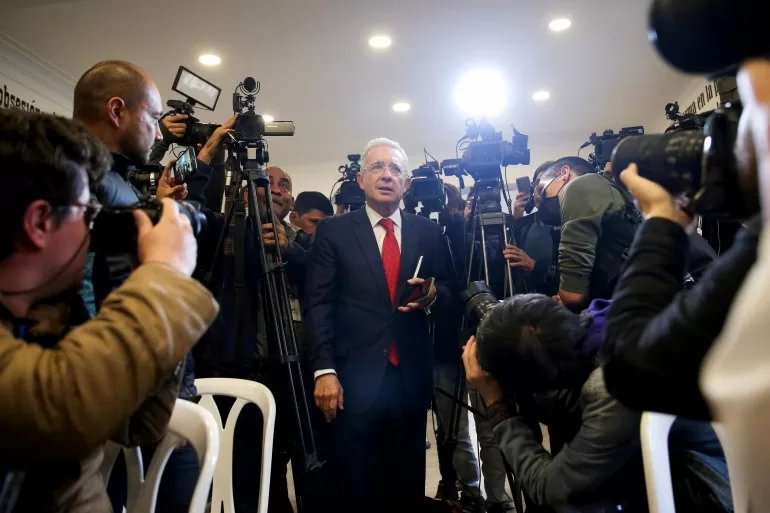Never before has a Colombian president stood trial on criminal charges. But earlier this week, the office of Colombia’s attorney general, Luz Adriana Camargo Garzon, announced that prosecutors would file a criminal complaint alleging Uribe participated in witness tampering and fraud.
On Wednesday, Uribe responded with a video statement broadcast to social media.
“The trial is being carried out for political persecution, for personal condemnation, for political revenge, without proof that I sought to bribe witnesses or deceive justice,” Uribe, 71, said.
He underscored that there was no evidence linking him to any wrongdoing, nor to any of the paramilitary groups embroiled in Colombia’s decades-long internal conflict.
“They are opening the doors of the jail without proof,” Uribe added.
His political party, the right-wing Democratic Center group, also took to social media to express support for the former president.
The group said it received the news of the pending criminal charges with “pain and sadness”.
“Like a large majority of Colombians who have believed and supported Alvaro Uribe Velez, the Democratic Center maintains its firm conviction in the innocence and honourability of the former president whose work and legacy in Colombia have been done with infinite love and a great commitment to the country,” the Democratic Center wrote in a post on Tuesday.

So far, the criminal charges have yet to be filed, and no hearing has been set.
But a conviction for witness tampering could carry a sentence of up to 12 years. On the procedural fraud charge, Uribe could face up to eight years.
Uribe has long been under scrutiny for alleged crimes committed under his administration, which lasted two terms, from 2002 to 2010.
Tuesday’s announcement stems largely from decade-old accusations that Uribe attempted to silence witnesses who tied him to the creation and activities of a right-wing paramilitary group.
In 2014, a left-wing senator named Ivan Cepeda raised concerns in the legislature that Uribe had links to the United Self-Defence Forces of Colombia (AUC), a paramilitary organisation accused of human rights abuses and drug trafficking.
Colombia has been embroiled in a six-decade-long internal conflict, with government forces, far-right paramilitaries, left-wing rebels and criminal organisations all competing for power and territory.
While in office, Uribe cultivated a reputation for taking a strong-armed approach to the leftist rebel groups, deploying the military against organisations like the Revolutionary Armed Forces of Colombia (FARC) and the National Liberation Army (ELN).
He was also considered a close ally of the United States during its global “war on drugs”.
But Uribe’s tactics elicited concerns about human rights violations. Under his administration, the military was accused of killing civilians in remote areas and counting them as enemy combatants, a string of incidents known as the “false positives” scandal.
After leaving office, Uribe continued to exert significant sway over Colombian politics, even leading a campaign against a 2016 peace deal with the FARC.
This week, his supporters took to social media to defend the popular former president with the hashtag #CreoEnUribe or “I believe in Uribe”.

After Senator Cepeda raised questions about Uribe’s alleged ties to the AUC paramilitary, prosecutors say the former president attempted to persuade witnesses to retract their statements.
One of those witnesses is expected to be Juan Guillermo Montsalve, a former paramilitary member who claims Uribe helped to expand the AUC.
Montsalve has previously accused Uribe of using his lawyer, Diego Cadena, to offer him bribes in exchange for withdrawing his testimony.
The announcement of impending criminal charges comes shortly after Camargo Garzon was elected attorney general in March.
She was one of three candidates President Gustavo Petro put before the Supreme Court for a vote. In power since 2022, Petro is considered the first left-wing leader elected in Colombia.
The Supreme Court previously launched the investigation into Uribe. Twice, prosecutors had attempted to end the investigation — and in both cases, judges had rejected their requests.
Uribe was placed under house arrest in 2020 while the investigation into the witness tampering allegations unfolded.
